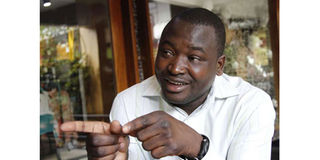Premium
Shofco wins prestigious UN global award

Shining Hope for Communities (SHOFCO) founder and director Kennedy Odede.
Shining Hope for Communities (Shofco), a community-based organisation in Kibera, Nairobi, has been awarded this year’s UN-Habitat Scroll of Honour prize in a ceremony held Monday in Yaoundé, Cameroon, during the Global Observance of World Habitat Day.
Awarded yearly, Scroll of Honour is one of the world’s most prestigious prizes presented to groups working on sustainable urbanisation.
“It was our unanimous opinion that the Shining Hope for Communities should receive the award for being a leading example of community-led-change to eradicate extreme poverty in Kenya’s urban slums.
“Shofco focuses on the most vulnerable slum residents, including women and children, through service provision such as water, sanitation, and hygiene, health clinics and resources to combat gender-based violence,” Maimunah Mohd Sharif, UN-Habitat Under-Secretary-General and Executive Director, said in a congratulatory message to Shofco.
Global recognition
Accepting the award, Shofco founder and CEO Kennedy Odede thanked the UN-Habitat for recognising their work in the informal settlements across Kenya.
“This award gives us immense pleasure at Shofco. We thank the UN-Habitat for this great global recognition. It empowers us to work even harder as we serve the vulnerable in the informal settlements,” Odede said.
Shofco Gender Department’s Director Caroline Sakwa accepted the award in Cameroon on behalf of the organisation.
Shofco is spearheading large-scale transformation in urban slums by providing community advocacy platforms, education and leadership opportunities for women and girls, and critical services for marginalised communities living within informal settlements.
Shofco established the first clinic in Kibera in 2010 with just a handful of staff and volunteers to treat communicable illnesses but by 2014, the numbers had skyrocketed to about 300 patients per day, necessitating the creation of a major facility in Kibera and in 2015, expansion to Mathare.
With numbers rising, a need to be closer to the community gave rise to satellite clinics in neighbouring Manatha (2014), Kianda (2015), Subra (2017) and Makina (2017).
“The clinics were started from the idea that people should not die because of lack of healthcare,” Odede said, while speaking to CNN’s African Voices Change makers, a programme that focuses on African non-profit leaders with localised solutions.
Clean water
Mr Odede told how a struggle to access clean water saw him put provision of this basic commodity on top of his wish list when Shofco came into being.
It is for this reason that Shofco used a cutting-edge aerial piping system when it installed a water treatment facility in the slum which can pump up to 300,000 litres of water at a time to aerial pipes that connect to various water kiosks throughout the Kibera slums. The water goes to 24 kiosks stationed at strategic points.
The organisation has also put up two schools in the Kibera and Mathare slums under its Girls Leadership and Education Programme.
The schools have been put in place to empower girls from the slum community. Once admitted, the girls have access to a full scholarship.
The organisation has also put emphasis on gender-based violence (GBV) awareness and response services because of the overwhelming need and lack of services available.
Social groups
Through its Shofco Urban Network (SUN), the organisation has also brought together individuals and households through social groups run independently and organises them to actively seek tangible change in their community and society at large.
SUN seeks to build a strong urban network with the vision of giving the urban poor a voice and choice in their own community development.
SUN has over one million members in 24 slums across Kenya and that number is rising daily. SUN has created a self-sustaining Group Savings and Loans program for members and their immediate families with over 1,100 active saving groups.
Under the Sustainable Livelihoods Program, SUN is divided into two categories; SHOFCO Women’s Empowerment Project (SWEP) and SUN Youth.
As a result, 656 startups have come up, supported with business skills and training with Sh15.6 million ($143,000) saved in group savings and loan programs.
Mr Odede and his team are addressing the top six SDGs (no poverty, zero hunger, good health and well-being, quality education, gender equality, and clean water and sanitation) by giving job opportunities to slum dwellers, providing tuition-free education to disadvantaged girls, and assuring students receive free meals in their schools.





